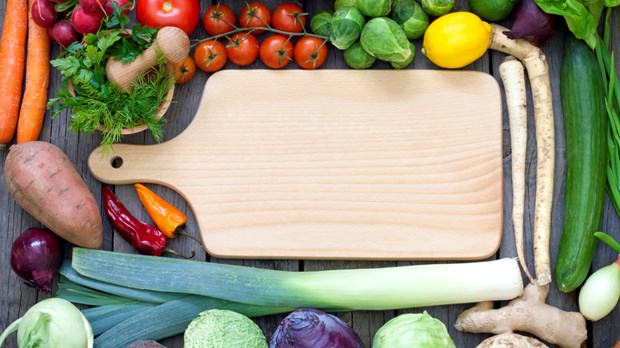Why I Became a Vegetarian

I grew up on meat and potatoes. And for a long time, I kept that tradition—quite literally—at my own table. Every evening I'd serve my husband hamburgers, chicken, pork chops, or steak . . . and potatoes. My idea of gourmet cooking was to add some rice or mix in a little salt. Sometimes I even used butter.
Then, abruptly, the tradition ended. My father-in-law suffered a heart attack; and, shaken with fear, I modified my menu. No more hamburgers or steak.
I now served chicken, potatoes, salad, and no butter.
Soon after starting this new meal plan, however, I became pregnant. And with great gumption, my doctor asked me to eat green things. I rose to the challenge. "You mean salad?" I asked.
"I mean broccoli or spinach," my doctor replied.
"Broccoli?" I whimpered. "Do I have to?" It seemed a little beyond my kitchen skills—and my taste. But love for my unborn child eventually changed my plate's contents: chicken, potatoes, salad . . . and broccoli.
I thought I was good for life.
A Fork in the Road
Then in my early thirties, life changed. A dear friend, 15 years my senior, unexpectedly became a vegetarian. She'd struggled with severe allergies and chronic fatigue, had researched her treatment options, and had finally decided vegetarianism could help. I was doubtful about her choice and still pleased with my own eating approach. Secretly, I wondered, Why would anyone add more broccoli to her diet?
But over the course of three years, my friend's health improved dramatically. She lost ten pounds. Her skin rivaled mine in youthful vigor. She no longer fell asleep in her chair during a conversation at 8 p.m.
I began to get curious. Soon, my friend and I started discussing a vegetable-based diet.
Intrigued by her claims that eating veggies is good for people and God's creation, I decided to do some research. The Complete Idiot's Guide to Being Vegetarian seemed to fit my level of nutritional knowledge. So I opened the book to some encouraging information: "Vegetarians have lower rates of cancer, coronary artery disease, diabetes, [and] high blood pressure." And in a world of toxic overload, the next statement was good news: "[Plant] fiber can bind with environmental contaminants and help them pass out of the body." I also learned vegetables protect against free radicals, bothersome molecules that speed the aging process and impair the immune system.
Then I discovered some disturbing information. Cruel slaughterhouse practices can cause extreme suffering for the animals. This knowledge brought new meaning to Proverbs 12:10: "A righteous man regards the life of his animals" (NKJV). I also found out animal agriculture is a major contributor to pollution of rivers and lakes. And producing a pound of beef can require 390 gallons of water, while growing a pound of wheat may take only 25 gallons. Since water shortages are closely tied to world hunger, I wondered if choices made with my fork could be a form of stewardship and ministry.
Does God Care What I Eat?
Suddenly, I realized God may have been up to something when he created the world and said, "I give you every seed-bearing plant . . . and every tree that has fruit with seed in it. They will be yours for food" (Genesis 1:29). I also remembered God originally created a world where no creature hurt—or ate—another. And he promised that in his future kingdom, "the lion shall eat straw like the ox," and "they shall not hurt nor destroy in all my holy mountain" (Isaiah 11:7 and 9, NKJV). Just as "the earth is satisfied by the fruit of [God's] work" (Psalm 104:13), I mused, perhaps the fruit of my work in the kitchen should satisfy the earth too.
Still, I didn't want to be the kind of legalist the apostle Paul referenced in Romans 14:2: "Some believe in eating anything, while the weak eat only vegetables" (NRSV). I knew God gave the animals into Noah's power after the flood, perhaps for him to eat in a vegetation-impoverished landscape. Later, God provided quail for the Israelites in the desert. Then Jesus came to earth and undoubtedly ate Passover lamb with friends and family. He also cooked his disciples a fish breakfast, part of the regional and cultural cuisine.
I understood both meat and vegetables were part of everything God gave his children for life. He asked only for good stewardship of his gracious gifts: body, earth, and spirit. For some people, fulfilling this command meant picking up meat with their forks. But for me, by the end of my research, I knew caring for God's creation meant doing the unthinkable.
I had to betray my meat-and-potatoes roots and become a crunchy granola woman.
Our Kitchen Conundrum
Altering my dietary lifestyle was difficult, but certain benefits eased the transition and have improved my family's lives. Our tasty vegetable cuisine has kept my blood pressure at a youthful level and contributed to better overall health. And my husband gratefully acknowledges his low cholesterol, despite a family heritage of high cholesterol and heart disease.
He still sometimes misses meat, but he loves coming home to the wonderful new aromas and tastes of our kitchen. Through my search for interesting meatless recipes, I've become a more versatile cook. Our diet change opened up a whole world of ethnic cooking, from Indian and Greek to Moroccan and Turkish food.
Yet I've been careful to keep meals simple. At first, I was tempted to make elaborate recipes from gourmet vegetarian cooking magazines. Soon, however, I developed a monthly meal plan of easy-prep recipes to satisfy my family's tastes and nutritional needs. My family members love potatoes or lentils, and enjoy the variety of red bean night, chickpea night, or egg night. And I'm relieved to avoid the persistent question: "What should I make for dinner?"
Eating out has proved more challenging—and humorous. I often face misunderstandings about what a vegetarian actually eats. Recently, at a retreat center, the chef served me a gourmet heap of broccoli over a pile of rice. (Maybe he thought I was pregnant?) The next evening, he skewered three mushrooms and four pieces of pepper, microwaved them until slightly shriveled, and, yes, placed them on a bed of rice. (Maybe he thought I was dieting?) That incident ended in a laugh, but other experiences haven't been so simple.
Meaty Discussions
Since becoming a vegetarian ten years ago, I've faced social discomfort similar to that accompanying a religious conversion. Friends and family have made jokes and subtly questioned my sanity. People have felt judged because of my lifestyle, and offered explications of meat's nutritional wonders.
Early on, I didn't respond well to pressures about my choice. One night, at a restaurant, my father asked, "Why don't you order this savory chicken dish?" He knew about my vegetarianism, but I explained myself anyhow. "I'm a vegetarian, Dad." He wasn't fazed. "How about this tender pork dish?" Again, I said no. "Well," he responded, "don't you ever eat just a little chicken, or maybe some pork?" Losing patience, I said, "Don't you ever smoke just a little cigarette?"
I apologized a few days later for my lack of graciousness. My comment had shown little accommodation of his perspective based on 1 Timothy 4:4: "For everything God created is good, and nothing is to be rejected." Yet I did understand that perspective from my years of meat eating. And I didn't even necessarily recommend my vegetarian lifestyle for other people. So I was pained to think I expressed a practice unable to make space for other approaches.
Indeed, because of my initial strictness about vegetarianism, friends hesitated to have my family to dinner. What could they cook to satisfy me? Today, when someone invites us over and asks what to prepare, I say, "Make whatever you would for your family" or "We love vegetables and beans."
As with faith, a fine line separates damaging compromise and needless offense. So I'm careful to communicate I'm a vegetarian because I believe "'all things are lawful' . . . but not all things are beneficial" for my body and the current state of the world (1 Corinthians 10:23, NRSV). And instead of always focusing on my own lifestyle choice, I'm daily learning to extend, receive, and appreciate grace.
L.L. Barkat, the author of Stone Crossings: Finding Grace in Hard and Hidden Places (IVP) and a speaker for WTW Ministry, lives in New York. Visit her blogs Seedlings in Stone and Green Inventions Central.
Copyright © 2008 by the author or Christianity Today/Today's Christian Woman magazine.
Click here for reprint information on Today's Christian Woman.
Read more articles that highlight writing by Christian women at ChristianityToday.com/Women
 Read These Next
Read These Next
 White as SnowWas Glorianna Wilson really the right person to play the angel in this year's Christmas pageant?
White as SnowWas Glorianna Wilson really the right person to play the angel in this year's Christmas pageant?
 Where Have All the Gray-Haired Ladies Gone?Embracing age in a youth-obsessed culture
Where Have All the Gray-Haired Ladies Gone?Embracing age in a youth-obsessed culture








 Homepage
Homepage